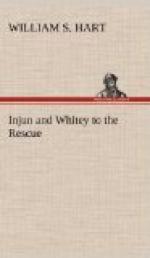In what followed, Injun left some of the details to the imagination of his hearers, or perhaps thought that they knew of them. Of how, before the great war dance, the chiefs of the tribe assembled in conclave in their council tent. And before these chiefs, who sat as a sort of jury, appeared the young men of the tribe. And each young Indian told of his brave deeds, performed since the last war dance, and according to these deeds the chiefs decided whether the young man was worthy to become a chief.
He needed no witnesses; his word was sufficient—for the Indian spoke only the truth. And the descendant of a chief was held more worthy of honor than another, for brave blood flowed in his veins. But after each young man was deemed worthy, he must prove his bravery at the dance. From a center pole hung a number of rawhide thongs. Through the breast or back of each young brave two slits were cut, and a stick or skewer was passed through them, and a thong tied to each end of the skewer. Then the braves danced around the pole, leaning back and supporting their weight on the skewer, and when this weight tore the skewer from the flesh, the braves were deemed worthy to become chiefs. But should one give up, or faint from pain, he was deemed unworthy. And the torture suffered by all was great—but the torture borne by those through whose backs the skewers were passed was greater.
“White Chief and scout come to Indian war dance,” Injun continued. “At dance, when braves make talk and tell how they do things what make ’em chief, my mamma’s brother he tell how him ride on prairie and see two white men. Him ride to them quick to show him friend. White men say Injun bad. White men shoot at my mamma’s brother. My mamma’s brother him shoot at white men. Him kill white men. My mamma’s brother him made chief, after him dance with stick through breast until stick break.
“Scout, my mamma’s brother friend, and White Chief they go ’way. My mamma’s brother friend him say to White Chief, ’You see now why you no tell. Injun him good, no blame. White men they bad, want kill Injun.’
“White Chief him say, ‘No, Injun bad. Me tell.’”
“Him go back and—”
The door of the bunk house opened suddenly and a cowboy stalked in, a lean, dark man, rather short and slim, with eyes of that peculiar light, slaty gray that have a staring effect; apparently no depth to them. These, with heavy overhanging brows and an inclination to sneer, gave him a forbidding appearance. His hat and slicker glistened with water. At his entrance Injun ceased speaking abruptly.
“Gee, I got soaked in that rain,” said the newcomer. “Stopped at th’ Cut on my way back from th’ Junction. Th’ railroad hands got paid, to-day, an’ they’re raisin’ cain. Wisht I’d stayed there, ‘stead o’ gettin’ soaked.”
“I wish you had, too,” Bill Jordan murmured to himself, unheard by the other.
This puncher, Henry Dorgan, was a man who was vaguely disliked on the ranch, with nothing in particular on which to hang the cause of the feeling. It was characteristic of him, for one thing, that he had no nickname. In a country where almost every one’s name was familiarly shortened into Hank, or Bill, or Jim, or was changed to Kid, or Red, or Shorty, he remained Henry—not even Harry.




